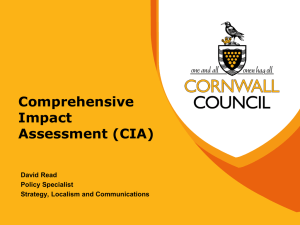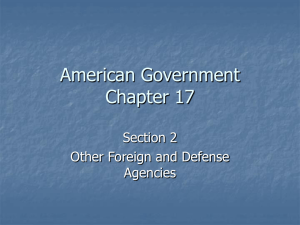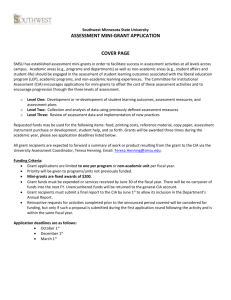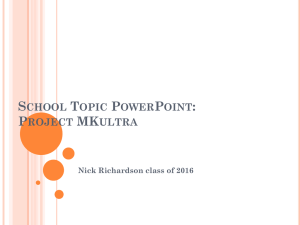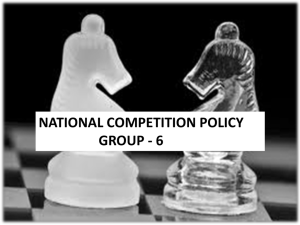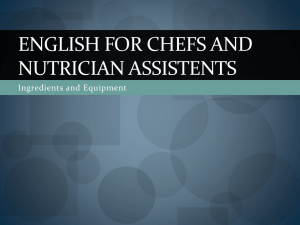Syllabus
advertisement
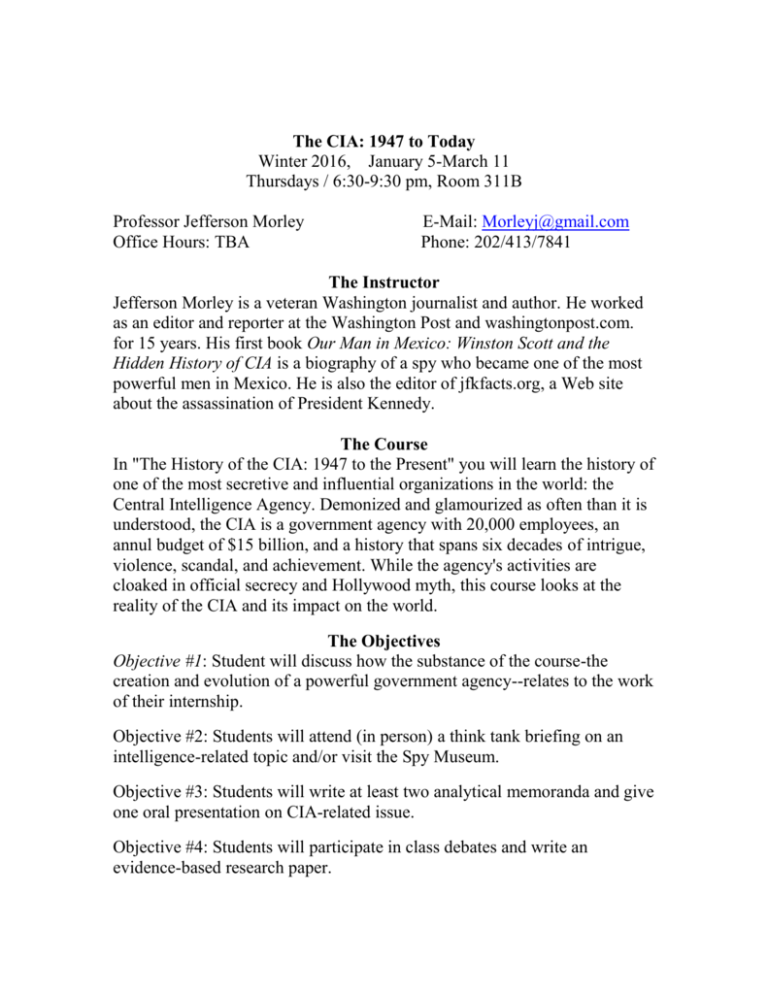
The CIA: 1947 to Today Winter 2016, January 5-March 11 Thursdays / 6:30-9:30 pm, Room 311B Professor Jefferson Morley Office Hours: TBA E-Mail: Morleyj@gmail.com Phone: 202/413/7841 The Instructor Jefferson Morley is a veteran Washington journalist and author. He worked as an editor and reporter at the Washington Post and washingtonpost.com. for 15 years. His first book Our Man in Mexico: Winston Scott and the Hidden History of CIA is a biography of a spy who became one of the most powerful men in Mexico. He is also the editor of jfkfacts.org, a Web site about the assassination of President Kennedy. The Course In "The History of the CIA: 1947 to the Present" you will learn the history of one of the most secretive and influential organizations in the world: the Central Intelligence Agency. Demonized and glamourized as often than it is understood, the CIA is a government agency with 20,000 employees, an annul budget of $15 billion, and a history that spans six decades of intrigue, violence, scandal, and achievement. While the agency's activities are cloaked in official secrecy and Hollywood myth, this course looks at the reality of the CIA and its impact on the world. The Objectives Objective #1: Student will discuss how the substance of the course-the creation and evolution of a powerful government agency--relates to the work of their internship. Objective #2: Students will attend (in person) a think tank briefing on an intelligence-related topic and/or visit the Spy Museum. Objective #3: Students will write at least two analytical memoranda and give one oral presentation on CIA-related issue. Objective #4: Students will participate in class debates and write an evidence-based research paper. Objective #5: Students will be able to comment knowledgably on CIA actions in the news. The Course Materials The reading of the course consists primarily of selected chapters from Tim Wiener's Legacy of Ashes. These readings will be supplemented by other book excerpts and published articles. PDF copies of the selected chapters of Legacy of Ashes and all reading material will be made available through Blackboard at no cost. Responsibilities and Assignments You will be responsible for reading, participating in class discussions, doing short assignments and the weekly reading, typically 25-40 pages per week. Grading 20 percent of your grade will be based upon your participation in classroom discussions and response to short writing assignments, including Tweets and blog posts. 35 percent will be based on three quizzes and one tests: --The 15-minute quizzes will be given on 2nd, 4th and 7th sessions of the class (worth 5 points each) --The 30-minute test will be given on the 8th session of the class (worth 20 points) 20 percent will be based upon a 3-page "Spy's Report," due at the 5th session; 35 percent will be based upon a 6-10 page research paper, due at the 9th session; Grade Scale: A: 90-100 points; B: 80-89; C 70-79; D: 60-69. F: Below 60 The Course Plan Week 1 —Introduction to the Course and the CIA In the first half of the class, I will give a survey of the course and its content, explaining the overall approach and themes. I will describing briefly the content of each of the teens session, how they build upon each other, and identifying the broad questions about the CIA that will be addressed, I will also layout the requirements and expectations for students. The second half will follow the template for most of the ten class sessions: a class discussion of CIA activity in the past week, with a focus on a region or topic, followed by a lecture on the history of the CIA. In the first session I will talk about the origins of the CIA in the 1943-47. Required Reading for Week 2 --"Legacy of Ashes," by Tim Weiner, Chapters 8-10, pp. 83-119 Week 2---The Rise of Covert Action * Quiz #1: The difference between espionage and covert action Discussion: CIA in the news Focus: Middle East I will trace the rise of the agency in the 1950s under Allen Dulles. We'll examine the agency's success in overthrowing a nationalist government in Iran in 1953 and a liberal-reformist government in Guatemala in 1954. We'll look at how the CIA organized those operations, why they succeeded, and how they shaped the future of those countries. Required Reading for Week 3: --Legacy of Ashes, Chapter 17, pp. 197-211 --"Washington, The Bay of Pigs," from "Nightwatch: 25 Years of Peculiar Service," by David Atlee Phillips (pp. 85-111) Week 3—Reckoning: From the Bay of Pigs to Dallas Discussion: CIA in the news. Focus: Latin America We will dissect the Agency's first true disaster, the failed invasion of Cuba at the Bay of Pigs in April 1961. We will look at agency's success during the Cuban Missile Crisis of October 1962 and the failure represented by the assassination of JFK in November 1963 Review/Select Document for the first paper, "A Spy's Report." Required Reading for Week 4 "Legacy of Ashes," by Tim Weiner, Chapters 21, 23 and 25, pp. 256-305 (not inclusive) Week 4—Escalation: From Vietnam to Chile * Quiz #2: The Organization of CIA Discussion: CIA in the news. Focus: Asia We'll look at the CIA's role in the escalation of the war in Vietnam and the spread of military governments in Latin America. We'll examine CIA intelligence estimates shaped Vietnam policy and response to leftist movements, armed and unarmed. We will watch the movie, "Missing," starring Jack Lemon about Chile in 1970. Required reading for Week 5: --"Legacy of Ashes," Chapters 30, 31, 33, pp. 368-393 (not inclusive) Week 5 --- Scandal: CHAOS on Capitol Hill Discussion: CIA in the news Focus: Africa We will watch a documentary about the CIA director William Colby, "The Man Who Nobody Knew" We will hear about the scrutiny that the CIA faced in the wake of the Watergate scandal, the exposure of Operation Chaos, which put thousands of Americans under surveillance from 1967-74, and the findings of the Church Committee, which changed the CIA's course. Required Reading for Week 6 --"Legacy of Ashes," pp. 459-477 --Article: "Confessions of a Contra," by Edgar Chamorro with Jefferson Morley, (New Republic, August 5, 1985) Extra credit: --"The CIA and the Media," by Carl Bernstein. Rolling Stone, Oct 20. 1977. Available at http://www.carlbernstein.com/magazine_cia_and_media.ph Week 6 —Troubled Revival: The Iran-Contra Scandal * First paper, A Spy's Report, is due Discussion: CIA in the news Focus: Europe We will trace how the Agency was curbed under President Jimmy Carter and then how it was unleashed by President Ronald Reagan. We study how Iran waged war on the CIA and how CIA's aggressive use of covert action in Iran and Nicaragua lead to the Iran-Contra scandal, in which top agency officers were indicted for violations of the law. Discussion and selection of topics for final paper assignment (due Week 9) Required reading for Week 7: --"The System Was Blinking Red," From The 9/11 Commission Report, pp. 254-277 Week 7: Failure I: The Road to 9/11 * Quiz # 3: The Vocabulary of the CIA Discussion: CIA in the news Focus: Should the CIA use torture? We'll look at the CIA's war on al-Qaeda starting in 1998 and examine the causes of the Agency' failure to identify the conspiracy organized by Khalid Sheik Muhammad and Osama bin Laden to hijack commercial airliners and fly them into targets in New York and Washington. We will watch the movie, "Syriana," starring George Clooney Required reading for Week 8 --"Legacy of Ashes"; "A Grave Mistake" pp. 562-574 --Iraq National Intelligence Estimate: October 2002 Week 8: Global War on Terror: The CIA Under George W. Bush * Test #1: Legacy of Ashes revisited Discussion: CIA in the news Focus: Should the CIA use extraordinary rendition We’ll talk about why the CIA concluded wrongly that Saddam Hussein had weapons of mass destruction, and how the Bush administration established systems for "extraordinary rendition" (extrajudicial detention) and "enhanced interrogation" (torture) and how those systems functioned. Guest Lecture: The CIA's Air Force Required Reading for Week 9 --Kill Chain, by Andrew Cockburn: "Drones, baby, drones," pp. 211-234 Week 9: Drone War: The CIA Under Barack Obama * Final Paper Due. Discussion: CIA in the news Focus: Should the CIA use targeted assassination? I’ll tell the story of how President Obama ended the torture system, curbed the practice of rendition, escalated the drone war, overcame Al-Qaeda's worst attack on the CIA and oversaw the assassination of Bin Laden Required Reading for Week 10 --Legacy of Ashes, Afterword, pp. 595-601 Week 10: The Future of the CIA Discussion: CIA in the news Focus: Does the CIA protect us? We'll watch the movie, "Zero Dark Thirty" about the killing of Osama Bin Laden General Information Check the weather forecast. In the event of a weather emergency, UCDC follows the federal government’s decisions about delays and closures. Classroom Conduct Act your age plus your IQ. We are sure to disagree in this class. We will also treat others in class with respect. Being polite and thoughtful in our interactions is not merely required. Please set your cell phones to silent and answer them only in an emergency (e.g. child care or medical for you or an immediate family member). If you leave class to answer a call, you may not return to class until we break. You rights to view electronic screens are not unlimited in this class. You may be asked to turn off your cell phone, laptops, and portable devices during class, at the professor's discretion. Academic Misconduct Don't do it. UCDC has a zero-tolerance policy for cheating, plagiarism, and any other form of dishonesty. Students should refer to their home campus Student Code of Conduct for the regulations that apply to them. The burden is on each student to know what behaviors constitute cheating and plagiarism. Ignorance of these behaviors is not an adequate defense. Missed or Late Assignments Avoid them like the plague. Assignment deadlines are firm, and makeup assignments are permitted only for excused absences (see above). You may submit assignments early, but I do not guarantee early feedback. Missed assignments. Assignments can be made up only for excused absences (see above). Be aware that you may be asked to turn in a written assignment before the deadline, and the makeup assignment may be different than the original assignment. If there is some other reason for you to miss an assignment (e.g. a previously scheduled family engagement), you must inform me within the first week of classes to be considered eligible to make up the assignment; this is not a guarantee that you will be allowed to make up the assignment. If you do not meet these conditions, you will receive a zero for the assignment. IMPORTANT: You should discuss make up assignments with me as soon as you are aware of them in office hours or by email; I will not discuss these arrangements in class. Late assignments. All assignments are considered due at the beginning of each class period. Assignments submitted after the time and date at which they are due, and that are NOT accompanied by an acceptable excuse (as described previously) will be addressed as follows. For every 24 hour period after the date and time that the assignment is due (including weekends), the grade received for the assignment will be decreased by two (2) parts of a grade. The 24 hour periods include weekends. For example, if you turn in an A quality assignment on Friday before 11:00 am, after it was due on Wednesday at 11: , then the assignment will be 2 days late and you will earn a B- on that assignment. If you turn in a B quality assignment at that same time, you will earn a C-. Sexual Harassment Don't do it. The University of California is committed to creating and maintaining a community where all individuals who participate in University programs and activities can work and learn together in an atmosphere free of harassment, exploitation, or intimidation. Every member of the community should be aware that the University prohibits sexual harassment and sexual violence, and that such behavior violates both law and University policy. The University will respond promptly and effectively to reports of sexual harassment and sexual violence, and will take appropriate action to prevent, to correct, and when necessary, to discipline behavior that violates this policy on Sexual Harassment and Sexual Violence. (See: http://policy.ucop.edu/doc/4000385/SHSV) Students with Disabilities Talk to me. In compliance with the Federal Rehabilitation Act of 1973, as amended (Public Law 93-112) and the Americans with Disabilities Act of 1990 (Public Law 101-336), University of California policy prohibits unlawful discrimination on the basis of disability in its programs, services, and activities. If you require accommodation for class, please let me know at our first meeting (if not earlier) so the necessary arrangements can be made. (See http://policy.ucop.edu/doc/2710534/PACAOSP140. )
